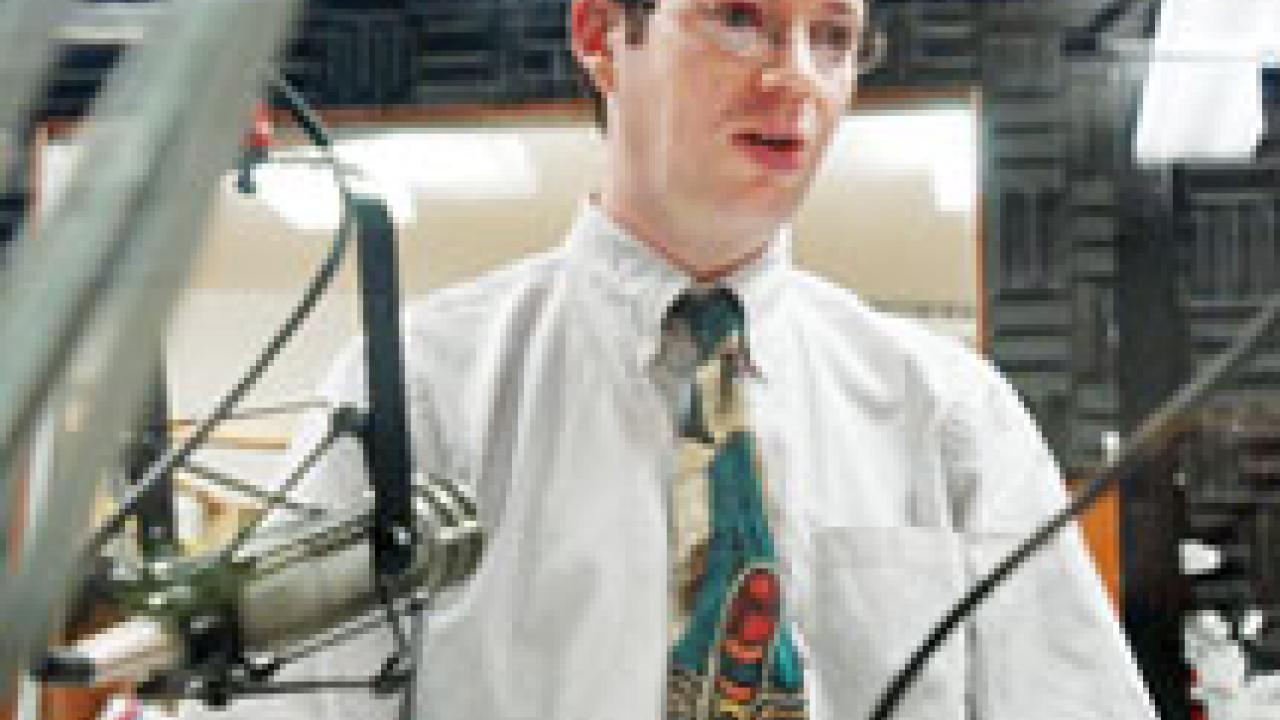Andy Jones is a culture lover. Whether in the rise of byte-based machines or in the poetic fever that swept through Victorian England, Jones, an English department and University Writing Program lecturer, finds the broad swath of culture fascinating in how it illuminates our self-images, assumptions, dreams, and good and evil itself.
"My first love was poetry," says Jones, counting T.S. Eliot, Robert Lowell, John Keats, William Wordsworth and Elizabeth Bishop as among his strongest lyrical influences. "But I wear lots of hats, and one of my interests is the juxtaposition of poetry and technology."
And yes, Virginia, poetry and technology do play well together. In addition to teaching writing and literature classes and directing the computer-aided instruction program, Jones hosts "Dr. Andy's Poetry and Technology Hour" on the student-run KDVS 90.3 FM radio station. The show, highlighted by an eclectic assortment of poets and writers on tech-oriented themes, airs every Wednesday from 5 to 6 p.m.
Jones, who earned his doctorate in English at UC Davis, started the radio show in 2000. That's when he first taught "Introduction to the Principles of Literary Criticism."
"I was so inspired by this class and wanted to follow up on the poet Percy Shelley's call to recognize poets the 'unacknowledged legislators of the world.' In other words, it was time to refute Plato's rap against poets," said Jones, explaining that Plato claimed poets should be either exiled from the ideal republic or have their energy redirected into more productive areas.
With all respect to Plato, Jones has been plenty productive in spearheading the computer-aided instruction program. Founded in 1990, the program has grown steadily in supporting the teaching of writing in on-campus computer classrooms. It also serves to help literature and composition instructors use the tools of instructional technology in teaching students.
It is a somewhat ironic fit for Jones.
"I was never a techie when I was a kid," said Jones, who proclaims himself a Macintosh guy. "Our family bought our first computer late, and I never had a computer as an undergraduate."
While technology certainly has its value he says, it alone only goes so far in satisfying the human condition. He notes the popularity of movies like the "Lord of the Rings" series, which reflect simpler, less complex times with imaginative environments.
"People are looking for myths they can believe in. It's both escapist and substantive at the same time. Our world is so complex now. When we go elsewhere -- on the screen, for example -- for a clearer sense of good and evil, then we sometimes stop thinking about events like 9/11."
Culture-loving runs in the family. Jones grew up in Washington, D.C., with a father who was a well-known entertainment critic on television and is now a theater and playwriting professor at the University of Nevada, Las Vegas. Jones' brother is a writer for People magazine.
The offbeat is Jones' drumbeat. His doctoral dissertation, "Mad Men," examined the use of unstable narrators in 20th century American poetry. He has taught at UC Davis since 1990, including classes on scientific writing, technical writing and writing for educators, and literature classes on topics such as T.S. Eliot, film criticism, and science fiction.
What's the biggest issue in composition and writing?
How best to prepare students to meet their academic and professional goals. We want to help students think critically and creatively and place these thoughts into context -- that happens in successful writing.
What do you like best about your job?
Teaching students. I'm fortunate to work and interact with students in so many different circumstances, from teaching classes, to overseeing the UC Davis undergraduate medical journal, to hosting the radio show.
And least?
I am very teaching-centered and student-centered in my approach to education. While a research university like UC Davis offers many benefits to society as well as its own faculty and students, I think as a community we should focus more of our efforts and resources on making the learning experience in the classroom more interactive and rewarding for our students.
What's something surprising about you?
My wife and I appeared on the "Oprah Winfrey Show" in 1992. Oprah's show was about the strange ways people meet and then get married. My wife and I met in London, England, while we were studying there. It turned out that on the same day we both rented the same room in a townhouse from different identical twin brothers -- and amid all the confusion, we decided to share the room.
Read any good books lately?
Al Franken's Lies and the Lying Liars Who Tell Them. My wife and I read it to each other recently while driving to Las Vegas with my son and daughter. We could hardly stop laughing.
What is one of your most treasured possessions?
My father recently played King Lear with his tie collection, and asked my brother and me to pick out our 35 favorites from his collection of more than 200. I treasure them for their connection to him and because of the memories about each one that he shared with us. Otherwise, I've been dispossessing myself of possessions, especially my books. It feels empowering and liberating to give them away to places like schools and libraries. In my field, a collection of books can become a status symbol, and I used to find myself collecting books for the sake of collecting them.
What's your guilty pleasure?
Every Sunday night I trek to a British Pub in midtown Sacramento to participate in a trivia contest known as a "pub quiz." We usually win enough prizes to cover our food and drink bill. It's a lot of fun. •
Media Resources
Clifton B. Parker, Dateline, (530) 752-1932, cparker@ucdavis.edu
